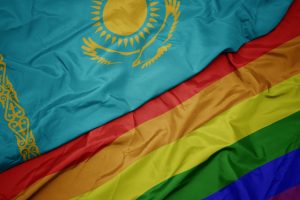On May 29, activists Zhanar Sekerbayeva and Gulzada Serzhan were detained in Shymkent, Kazakhstan. Sekerbayeva and Serzhan, co-founders of queer-feminist group Feminita, had traveled to Shymkent – Kazakhstan’s third-largest city located 430 miles west of Almaty – for an event on lesbian, bisexual, and transgender women’s rights.
Unfortunately, the event was derailed before it could even begin. Sekerbayeva and Serzhan were blocked from the hotel they had rented to meet with 20 women from Shymkent about queer women’s rights. Sekerbayeva later reported on social media that she noticed several officers from Kazakhstan’s National Security Committee (KNB) filming them, and after she asked them to stop, the situation escalated. A crowd of several dozen men harassed the event attendees and singled out the co-organizers, yelling at them to leave.
As shown in one of several videos that have circulated on social media, after several minutes of arguing, a man in a police uniform grabbed Sekerbayeva and began to drag her toward a car. As the officer shoves her into the vehicle, Sekerbayeva shouts, “Let me go! I’ll go myself!”
That evening, news outlets reported that Shymkent police were opening a criminal case against Sekerbayeva and Serzhan for “insulting a government representative.”
Kazakhstan’s human rights community jumped into action, and news of Sekerbayeva and Serzhan’s detention spread quickly across social media. One remarkable feature of the social media campaign was that support did not propagate through a large volume of posts connected by a hashtag (only 15 Instagram posts were tagged #свободужаннаригульзаде — “Free Zhanar and Gulzada”). Rather, social media users left hundreds of comments on a few central posts tagging the Instagram account of Shymkent’s police department and President Kassym-Jomart Tokayev. This digital support was complemented by a small in-person demonstration, with a crowd of supporters gathering on the evening of the 29th at the police station in Shymkent where Sekerbayeva and Serzhan were held.
The next day, Shymkent police made a statement regarding the detention of Sekerbayeva and Serzhan. “The police officers took necessary measures to ensure the safety of the organizers and participants of the event, taking into account the threat to the lives of the event’s participants,” a police representative said.
The police made a weak attempt to justify the decision to detain Sekerbayeva and Serzhan, but it remains unclear whether they will proceed with the criminal case the two activists for “insulting a government representative.” Human rights activists and media experts have campaigned for years to remove criminal liability for defamation and insult from Kazakhstan’s criminal code. Reforms passed in June 2020 reduced the fines for defamation and insult, but these nebulous speech offenses continue to be weaponized against activists and journalists.
There is a depressing irony in these events unfolding the weekend before a holiday meant to commemorate the victims of political repression in Kazakhstan. Since 1997, Kazakhstanis have observed May 31 as a day of remembrance for those who suffered political repression. In this year’s annual address, Tokayev spoke of the mass violence experienced under Stalin and stressed the ways that tragedies of the mid-20th century shaped Kazakhstan’s historical identity.
But it is also necessary to recognize that present-day repression also shapes Kazakhstan’s identity. Despite authorities’ insistence that there are no political prisoners in Kazakhstan, human rights activists are concerned that the number of prisoners held for politically-motivated charges is growing. Even those who have been released from prison – such as Maks Bokayev, who played a key role in organizing protests against land reforms in 2016 – are not fully free, with the terms of their probation restricting them from activism.
Despite attempt after attempt to block critical voices from Kazakhstan’s public sphere, activists persist. Just hours after being released, Sekerbayeva and Serzhan sat down for an hour-long livestream on Instagram. The women laughed while showing bruises on their arms and faces, weaving between Russian and Kazakh to affirm their commitment to fighting for feminism and queer rights in Kazakhstan. “If you’ll beat us, we’ll talk about it and we’ll organize events and demonstrations. Shymkent showed us that women’s rights and feminism are necessary, and we’ll keep talking about it,” Sekerbayeva said in the last minute of the livestream. Serzhan followed up, “And we won’t stop.”

































